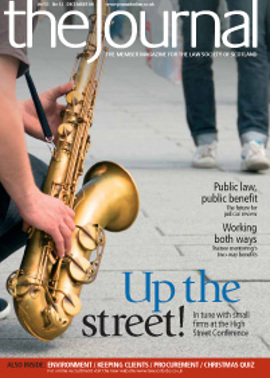Scottish Solicitors' Discipline Tribunal

Norman Douglas Paton Cathcart
A complaint was made by the Council of the Law Society of Scotland against Norman Douglas Paton Cathcart, Solicitor, 3 Lynedoch Place, Glasgow (“the respondent”). The Tribunal found the respondent guilty of professional misconduct in respect of his failure without reasonable excuse to ensure that remedial action in relation to registering a standard security in the register of charges was taken within a reasonable time to protect the interests of Lloyds TSB Scotland plc and his failure without reasonable excuse to ensure that the standard security instructed on 25 July 2007 was registered in the register of charges timeously to protect Lloyds TSB’s interests. The Tribunal censured the respondent and fined him in the sum of £2,000.
The Tribunal noted that the respondent had managed to resolve the situation and that the necessary standard security had been registered so that the bank’s interests were now protected. The Tribunal however considered that it had taken an extraordinary amount of time for this to be done and there did not appear to be anything extraordinary in the explanation provided by the respondent for the delay. The Tribunal accepted that matters were not straightforward to sort out, but noted that in the previous findings the Tribunal indicated to the respondent that it would take an extremely dim view if matters were not sorted out quickly after the last Tribunal hearing. It had taken the respondent almost 18 months since the Tribunal issued its previous findings, to sort matters out. The Tribunal considered that its displeasure with regard to this must be demonstrated and the Tribunal accordingly imposed another fine of £2000 in addition to a censure.
James Buchanan Donald
A complaint was made by the Council of the Law Society of Scotland against James Buchanan Donald, solicitor, 10 Sandalwood Drive, Inverness (“the respondent”). The Tribunal found the respondent guilty of professional misconduct in respect of his purporting to notarise the affidavit of a client outwith her presence and his tendering the same as evidence in a sheriff court case, and his forging and uttering the signature of an executrix.
The Tribunal censured the respondent, fined him in the sum of £5,000 and directed that any practising certificate held or to be issued to the respondent shall be for an aggregate period of three years subject to (one) a condition that he not act as a notary public, and (two) subject to such restriction as will limit him to acting as a qualified assistant to (and to being supervised by) such employer or successive employers as may be approved by the Council of the Law Society of Scotland or the Practising Certificate Committee of the Council.
The Tribunal was extremely concerned by the respondent’s conduct. The respondent had committed two dishonest and illegal acts in a four month period. This was totally contrary to the core values expected of a solicitor. The essential qualities of a solicitor are honesty, truthfulness and integrity. The public cannot have confidence in the legal profession if solicitors cannot be trusted to act honestly and not knowingly misrepresent facts. The respondent’s conduct in this case went to the root of what was expected of a solicitor and brought the profession into disrepute. The respondent knowingly disregarded the responsibilities of his profession and made dishonest representations to a court. It would appear that the respondent did this to avoid being embarrassed in front of a client, but this was totally unacceptable behaviour. The Tribunal noted that the respondent’s firm was still supportive of the respondent. The respondent’s self referral indicated that he had some insight into the seriousness of his faults and accordingly on this occasion the Tribunal stopped short of striking his name from the Roll. It was concerned to ensure that the respondent, having abused his position as a notary public, was not able to act as a notary public. It also considered it appropriate that the respondent work under supervision for a three year period to ensure that he maintain the appropriate standards. Given the serious view that it took of the respondent’s conduct, the Tribunal also imposed a fine of £5,000.
William Michael Lewis
A complaint was made by the Council of the Law Society of Scotland against William Michael Lewis, solicitor, 1 Hope Park Terrace, Edinburgh (“the respondent”). The Tribunal found the respondent guilty of professional misconduct in respect of his failure to reply to reasonable requests of the Society for information, his failure to carry out work in an expeditious fashion in the winding up of an executry, his failure to respond to clients, his acting in a conflict of interest situation, his failure to respond to a mandate, his persistent failure timeously to record dispositions, standard securities and discharges, his breach of rules 8(4), 9(2) and 10(2) of the Solicitors (Scotland) Accounts etc Rules 2001, his failure to keep a client fully and promptly informed about the position in relation to conclusion of missives in a conveyancing transaction, his failure promptly to clarify with the client the position in relation to the conclusion of missives where it was apparent or should have been apparent to him that she misunderstood the situation, his failure to be open and candid with his client in relation to potential and actual breaches of her contractual obligations under missives, his failure to spell out to his client the background which gave rise to the difficulties she found herself in and the associated risks, his failure to register a disposition in the Land Register within a reasonable time after settlement and his failure to register a standard security within a reasonable period after settlement.
The Tribunal censured the respondent and directed in terms of
s 53(5) of the Solicitors (Scotland) Act 1980 that any practising certificate held or to be issued to the respondent shall be subject to such restriction as will limit him to acting as a qualified assistant to and to being supervised by such employer or successive employers as may be approved by the Council of the Law Society of Scotland or the Practising Certificate Committee of the Council, and that for an aggregate period of at least 10 years and thereafter until such time as he satisfies the Tribunal that he is fit to hold a full practising certificate.
The Tribunal noted three previous findings against the respondent for analogous matters. It was concerned to note that although the respondent’s health seemed to have improved by May 2006, there were matters in the complaints as late as 2007. The Tribunal was extremely concerned with regard to the respondent’s conduct in respect of two clients who suffered a great deal of loss, stress and anxiety as a result of it. It accepted however that what happened in this case was part of the respondent’s inability to cope rather than anything more sinister. The Tribunal seriously considered striking the respondent’s name from the Roll or suspending him given the number of times that he had been before the Tribunal and his continued failure to respond even after previous findings of misconduct by the Tribunal. It however noted the fiscal’s comments that it is not easy for sole practitioners who are suffering from depression, and noted that the respondent was already subject to a three year restriction on his practising certificate. It considered that the respondent was not fit to be a sole practitioner and imposed an aggregate restriction of 10 years on his practising certificate. This would ensure that the respondent work under supervision for an extended period prior to being able to obtain a full practising certificate. At the end of the 10 year period the respondent would require to satisfy the Tribunal that he had gained the necessary experience and insight and that his health was such that there would be no repeat of his conduct.
Christine Margaret Murray
A complaint was made by the Council of the Law Society of Scotland against Christine Margaret Murray, solicitor of Murray Ireland Solicitors, PO Box 8140, Mauchline, Ayrshire (“the respondent”). The Tribunal found the respondent guilty of professional misconduct in respect of her failure to respond timeously, openly and accurately to the reasonable enquiries made of her by the Society and to statutory notices served by it. The Tribunal censured the respondent.
In relation to the first averment of professional misconduct, regarding the respondent’s failure to register a disposition and standard security, the Tribunal noted that this complaint involved a single failure to register two related deeds from a single conveyancing transaction. The Tribunal accepted the respondent’s explanation that she had instructed a member of staff to attend to the registration of the deeds. The Tribunal was aware that at the time of this transaction the Inland Revenue website where stamp duty was obtained online had only recently been introduced and was at times difficult to access. The Tribunal was of the view that mistakes do happen in practice and that in the absence of any aggravating factors a single mistake such as this did not amount to a serious and reprehensible departure from the standards expected of a competent solicitor and therefore did not amount to professional misconduct.
The Tribunal then considered the second averment of professional misconduct in relation to the respondent’s failure to respond to correspondence from the Society. The Tribunal noted that the respondent admitted to receiving two letters from the Society, one a letter intimating that a complaint had been made and the other a statutory notice. Both letters sought the respondent’s response to the complaint to enable the Society to investigate the matter. The Tribunal considered that the respondent was well aware that the Society has a duty to investigate any complaint regarding the conduct of a solicitor and that solicitors have a duty to respond to enquiries made by the Society in this regard.
Failure to respond to the Society prevents the Society from properly investigating complaints and can bring the whole profession into disrepute. For these reasons the Tribunal viewed the respondent’s failures to respond in these circumstances as serious and reprehensible and considered that her failures amounted to professional misconduct. It considered that the failures were at the lower end of the scale of professional misconduct and that the appropriate sanction was a censure.
In this issue
- Sale and purchase agreements – how to avoid the unexpected
- 2008: a year of change; 2009: a year for progress
- Law: it's the business
- Business makeover
- Training plus
- Registers update
- Public service
- One of a kind
- Brussels sprouts more eco-law
- Test yourself
- Trainees try again
- Terms of Business Guidance Note (November 2008)
- Guideline: Scanning and Archiving Documents (November 2008)
- Client, or customer?
- The changing faces of fraud
- Business advice roundup
- The year that crunched
- The anatomy of law firm failures
- Chapter and verse
- The power of agreement
- Under a cloud
- Scottish Solicitors' Discipline Tribunal
- ECJ in the fast lane
- Website review
- Book reviews
- Tender trouble
- Opportunity beckons, Smart tells symposium
- Public money or bust?






